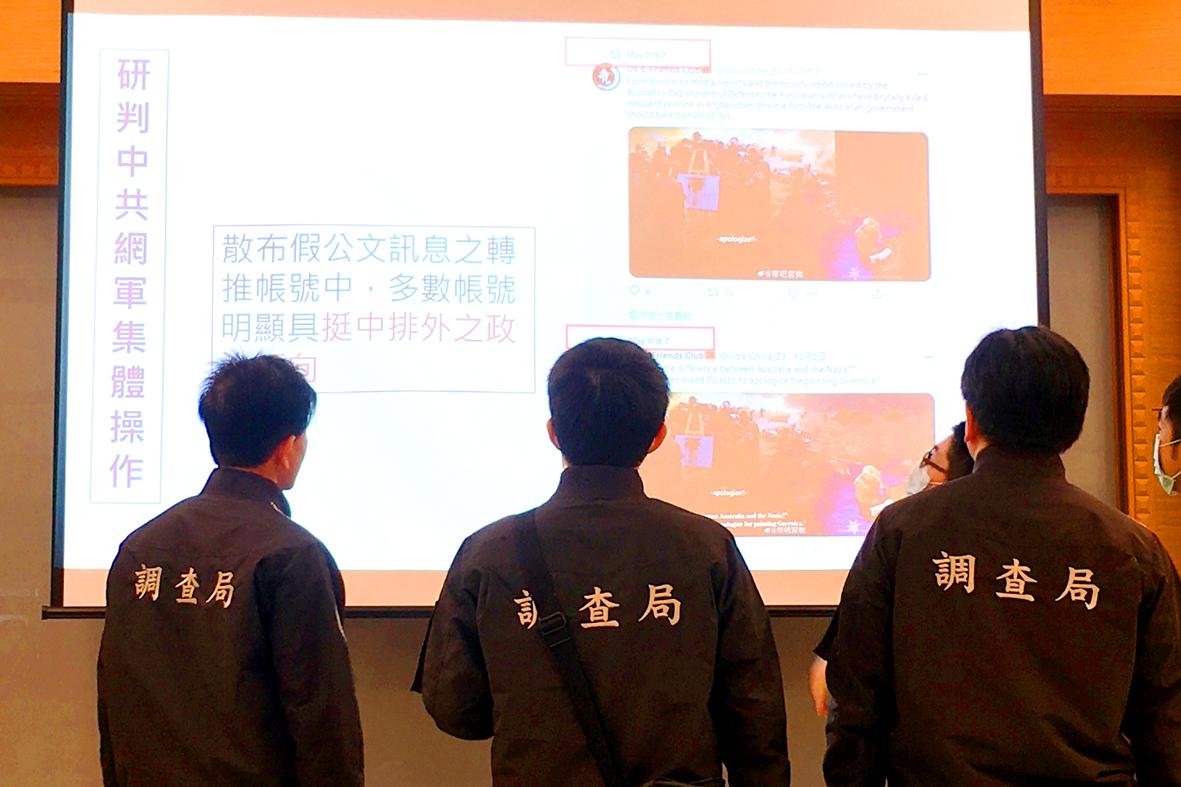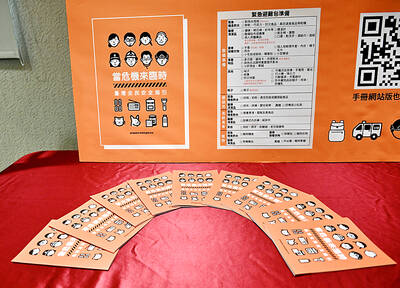Authorities on Thursday arrested three Taiwanese for allegedly working as agents of the Chinese government, spreading disinformation through social media networks, the Ministry of Justice Investigation Bureau (MJIB) said yesterday.
The three allegedly disseminated claims online that Taiwan and the US were collaborating to support pro-democracy protests in Thailand to destabilize its government, the bureau said.
After an investigation, the bureau located the suspects based on their IP addresses, and with the help of local police, it on Thursday carried out searches in New Taipei City and Hualien County, it said.

Photo: CNA
Two of the suspects were identified by their surnames, Liu (劉) and Yin (尹), with prosecutors looking to charge the trio with breaches of the National Security Act (國家安全法), it said.
Bureau officials said it was the first Internet-related national security case it had investigated, which showed that China had expanded its online disinformation efforts, making them more sophisticated and focused on wider swathes of the international community.
It is also the first documented case of Beijing successfully recruiting Taiwanese as paid online agents of its “cyberarmy,” working to undermine national security and harm Taiwan’s international relationships, bureau officials said.
After joining the operation, Liu and Yin allegedly went to China in August last year to receive training before returning late last year, officials in the bureau’s information and communication security division said.
Liu and Yin allegedly worked as administrators on Diba (帝吧), a Chinese online forum, the bureau said, adding that it uncovered evidence that since last year the two had carried out Chinese propaganda campaigns, targeting Taiwanese by spreading disinformation to sow confusion about the presidential election in January and the COVID-19 pandemic.
The two allegedly created various accounts on Facebook, Twitter, Line and other social media platforms used by Taiwanese, to produce and disseminate disinformation, bureau officials said.
They used the accounts to promote claims of voting fraud in the presidential election and posted images suggesting that there were COVID-19 infections that the government was covering up, the bureau said.
An investigation was launched after a document was circulated online, which purportedly showed an official letter from a bureau deputy section chief to the Presidential Office that asserted the agency was “working with the US government to foment street protests, as part of Thailand’s pro-democracy movement.”
Investigators discovered that the document was first posted on Nov. 20 on a Twitter account using a Thai name.
The post said that Taiwan and the US were “interfering in Thailand’s domestic politics, to create social division and unrest for Thais,” they said.
The bureau said that Liu and Yin allegedly also circulated documents which were translated into English and Thai.

One of two tropical depressions that formed off Taiwan yesterday morning could turn into a moderate typhoon by the weekend, the Central Weather Administration (CWA) said yesterday. Tropical Depression No. 21 formed at 8am about 1,850km off the southeast coast, CWA forecaster Lee Meng-hsuan (李孟軒) said. The weather system is expected to move northwest as it builds momentum, possibly intensifying this weekend into a typhoon, which would be called Mitag, Lee said. The radius of the storm is expected to reach almost 200km, she said. It is forecast to approach the southeast of Taiwan on Monday next week and pass through the Bashi Channel

NO CHANGE: The TRA makes clear that the US does not consider the status of Taiwan to have been determined by WWII-era documents, a former AIT deputy director said The American Institute in Taiwan’s (AIT) comments that World War-II era documents do not determine Taiwan’s political status accurately conveyed the US’ stance, the US Department of State said. An AIT spokesperson on Saturday said that a Chinese official mischaracterized World War II-era documents as stating that Taiwan was ceded to the China. The remarks from the US’ de facto embassy in Taiwan drew criticism from the Ma Ying-jeou Foundation, whose director said the comments put Taiwan in danger. The Chinese-language United Daily News yesterday reported that a US State Department spokesperson confirmed the AIT’s position. They added that the US would continue to

The number of Chinese spouses applying for dependent residency as well as long-term residency in Taiwan has decreased, the Mainland Affairs Council said yesterday, adding that the reduction of Chinese spouses staying or living in Taiwan is only one facet reflecting the general decrease in the number of people willing to get married in Taiwan. The number of Chinese spouses applying for dependent residency last year was 7,123, down by 2,931, or 29.15 percent, from the previous year. The same census showed that the number of Chinese spouses applying for long-term residency and receiving approval last year stood at 2,973, down 1,520,

EASING ANXIETY: The new guide includes a section encouraging people to discuss the threat of war with their children and teach them how to recognize disinformation The Ministry of National Defense’s All-Out Defense Mobilization Agency yesterday released its updated civil defense handbook, which defines the types of potential military aggression by an “enemy state” and self-protection tips in such scenarios. The agency has released three editions of the handbook since 2022, covering information from the preparation of go-bags to survival tips during natural disasters and war. Compared with the previous edition, released in 2023, the latest version has a clearer focus on wartime scenarios. It includes a section outlining six types of potential military threats Taiwan could face, including destruction of critical infrastructure and most undersea cables, resulting in